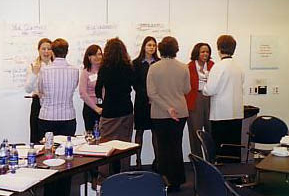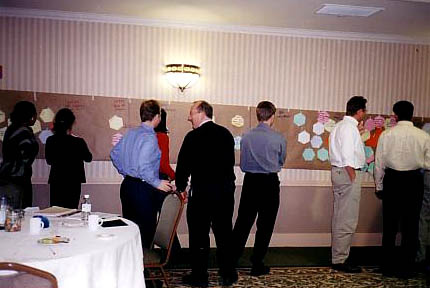Key Values and Operating Principles
The
notion that organizational leadership relies on one
individual
is unrealistic and unworkable today. We must foster
a shared leadership culture at every level of the organization
and make effective use of teams to address complex, constantly
changing business needs.
 Developing
effective leaders is part of a leader's job. Although
demand for effective leaders is high, the supply is dangerously
low. Organizations must define their leadership needs in
highly specific terms and devise and implement leadership
development strategies that are directly linked to their
overall competitive business strategies.
Developing
effective leaders is part of a leader's job. Although
demand for effective leaders is high, the supply is dangerously
low. Organizations must define their leadership needs in
highly specific terms and devise and implement leadership
development strategies that are directly linked to their
overall competitive business strategies.
Teams
are not just another management fad. Developing
true high-performance teams can effectively leverage organizational
resources and yield breakthrough results. When a critical
business or performance challenge requires a team structure,
a significant investment in team development is essential.
Successful
teams focus on the fundamentals. High performance
teamwork requires relentless attention to learning and continually
enhancing the basic skills and processes that keep team
members in peak condition. Failing to learn, practice and
master the fundamentals of the game is how you wind up losing
the game.
Loyalty
is an element that will define and differentiate organizational
excellence. Successful companies seek to build
and sustain the loyalty of not only their customers and
suppliers, but, most important, their employees. And to
gain loyalty, they must inspire trust—the fuel that
sparks deep commitment and positive contributions.
A finished
leader is a finished leader. The most successful
leaders we have worked with regularly ask themselves this
question: "How do I need to learn and change to get
the results I want?" They model the values and behaviors
they want from others and cultivate organizations of people
who take responsibility, aspire to learn and grow and consistently
demonstrate integrity and honesty.




